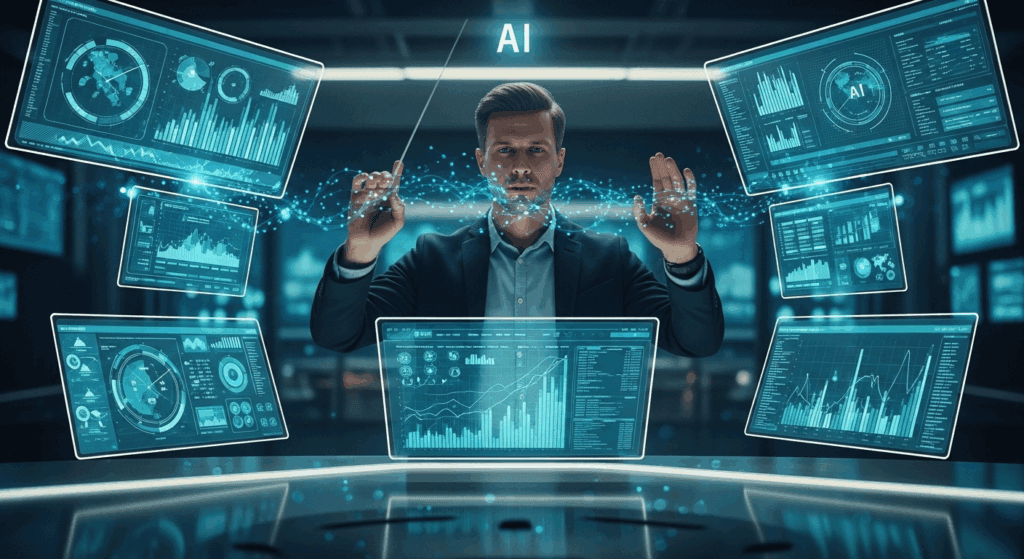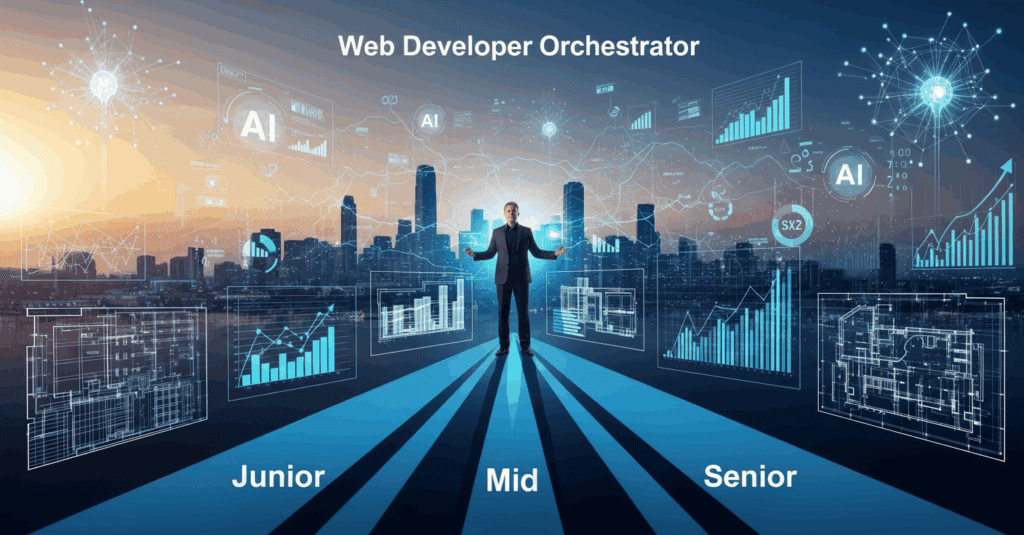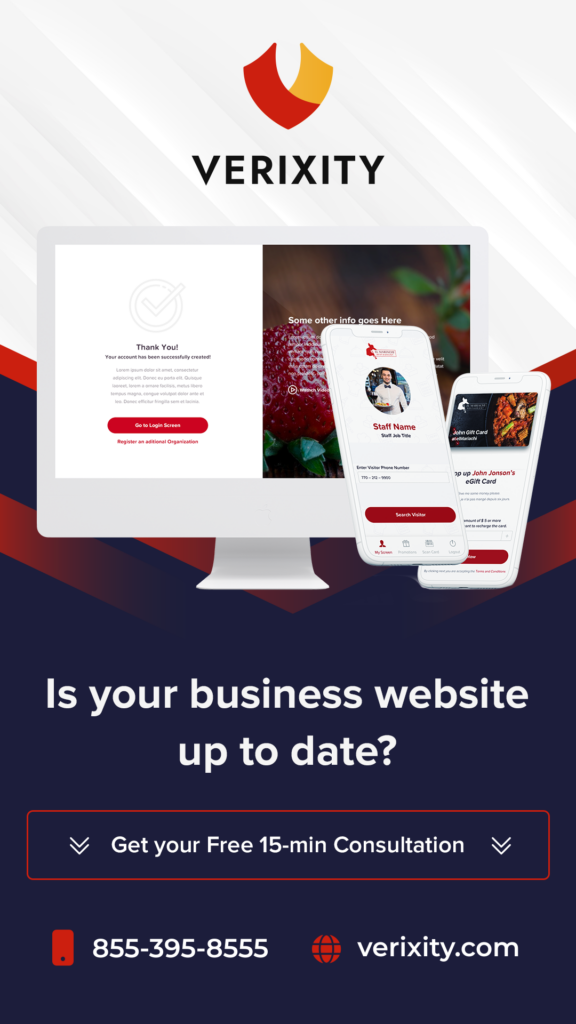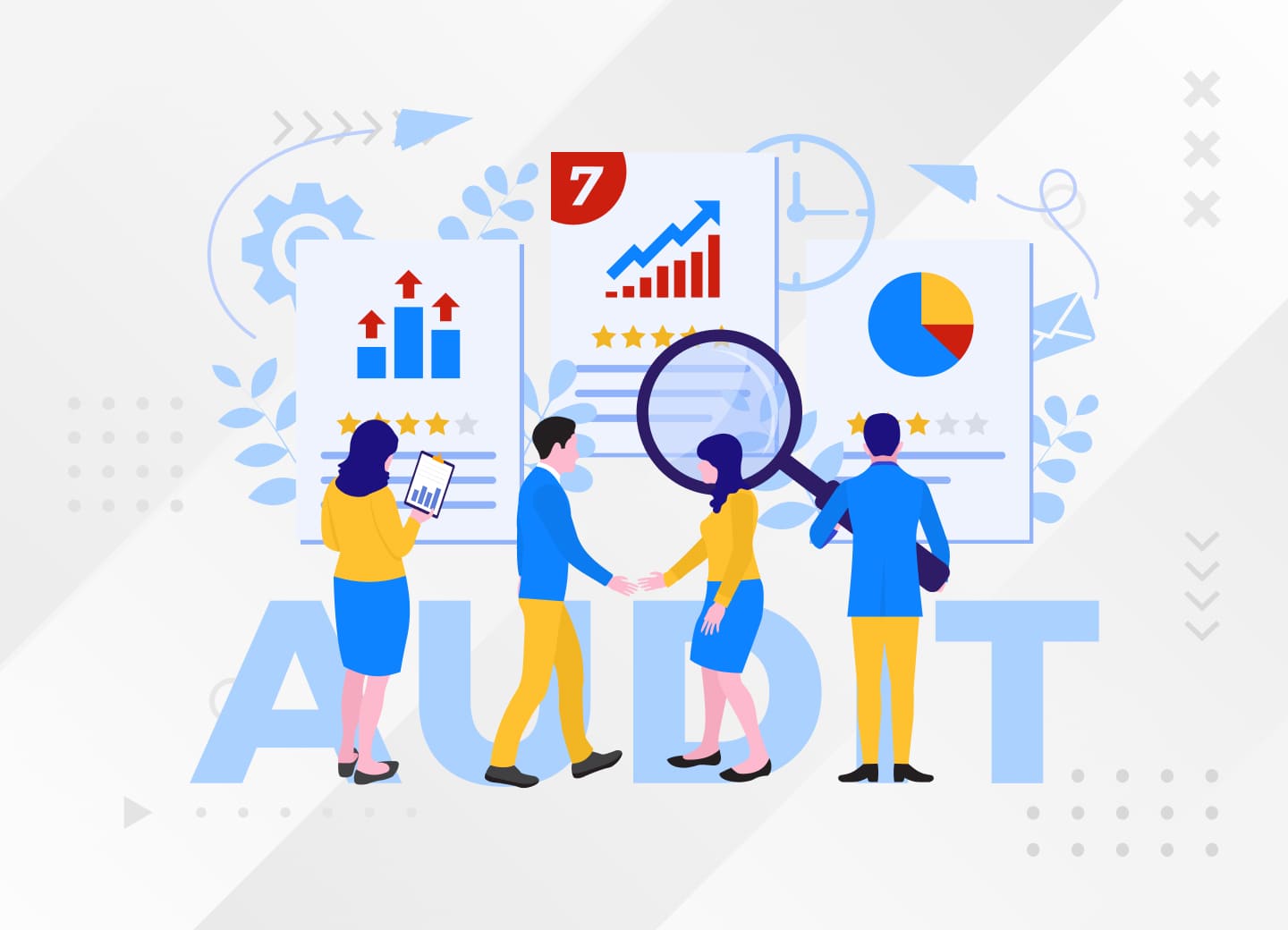The Evolving Role of the Web Developer: From Coder to Orchestrator (October 2025)

I. Executive Summary: The Strategic Advantage of the Orchestrator-Developer
In the rapidly accelerating digital economy of October 2025, the traditional image of a web developer as a solitary coder meticulously crafting lines of syntax is becoming increasingly obsolete. The advent of Artificial Intelligence (AI) and Large Language Models (LLMs) has fundamentally reshaped the landscape of web development, ushering in a new paradigm where technical proficiency alone is no longer sufficient. Today, the most valuable web developers are evolving into Orchestrators – strategic thinkers who bridge the gap between complex technical solutions and critical business objectives. For business owners in the USA, understanding and embracing this shift is not merely about keeping pace with technology; it’s about securing a profound strategic advantage that drives innovation, enhances efficiency, and ensures competitive longevity.
This article will delve into the profound transformation of the web developer’s role over the past three years, driven primarily by the pervasive influence of AI and LLMs. We will explore why this evolution from a pure coder to a multifaceted orchestrator has become an imperative, examining the success ratios across different experience levels (junior, mid, and senior developers) as they navigate this transition. Furthermore, we will articulate what modern businesses and forward-thinking web agencies are actively seeking in their development talent, and crucially, why this new breed of developer—one who seamlessly integrates the roles of a technical expert and a business analyst—represents an unparalleled investment for USA business owners. By the end of this exploration, it will be clear that hiring a web developer who embodies the orchestrator mindset is not just an expense, but a strategic imperative for unlocking sustained growth and innovation in the intelligent web era.

II. The Genesis of a New Role: AI and the Web Development Evolution (2023-2025)
The journey from traditional coding to AI-augmented orchestration has been swift and transformative, largely unfolding within the last three years. The period between 2023 and 2025 marks a pivotal era where AI transitioned from a promising tool to an indispensable partner, fundamentally reshaping the day-to-day realities of web development.
A. The AI Tsunami: Reshaping the Developer Landscape
2023: The Dawn of AI Assistance. The year 2023 witnessed the widespread introduction and initial adoption of sophisticated AI coding assistants, most notably GitHub Copilot. These tools began to demonstrate the tangible benefits of AI in automating repetitive coding tasks, offering context-aware suggestions, and even generating basic code snippets. Developers, initially curious, started integrating these tools into their workflows, experiencing early boosts in productivity. This period was characterized by a growing awareness that AI was not a distant future, but an immediate presence, albeit primarily as an assistant [1].
2024: Accelerated Integration and Market Shifts. By 2024, AI integration accelerated dramatically. As developers became more comfortable with AI tools, their capabilities expanded, leading to more significant productivity gains. However, this rapid adoption also began to expose the first fissures in the traditional job market. While overall productivity soared, the demand for purely manual coding tasks, especially those typically assigned to junior developers, started to wane. This year saw a notable increase in discussions around AI’s impact on employment and the need for developers to adapt their skill sets [2].
2025: AI as an Indispensable Co-Pilot and Hyper-Automation. Fast forward to October 2025, and AI has firmly cemented its role as an indispensable co-pilot. The focus has shifted towards hyper-automation and the emergence of agentic AI systems capable of autonomously handling entire development workflows, from code generation and testing to deployment and monitoring [3]. This means AI is no longer just suggesting code; it’s actively participating in the development process, freeing human developers to focus on higher-level strategic tasks. Gartner, a leading research firm, predicts that 75% of enterprise software engineers will be utilizing AI coding assistants by 2028, a monumental leap from less than 10% in early 2023, underscoring the rapid and irreversible nature of this shift [4].
B. The Decline of the Traditional Coder: Why Pure Coding is No Longer Enough
The profound impact of AI means that the role of a web developer can no longer be defined solely by the ability to write code. The very essence of what constitutes valuable technical contribution has evolved.
- The Diminishing Need for Manual Coding for Basic Functionalities: AI tools have become incredibly adept at generating boilerplate code, standard components, and even entire functional modules from high-level descriptions. This means developers spend far less time writing repetitive code for common tasks like form validation, API integrations, or basic UI elements. What once required hours of meticulous coding can now be achieved in minutes, or even seconds, with AI assistance [5].
- The Increasing Irrelevance of Rote Coding Skills in Favor of Higher-Order Thinking: The ability to memorize syntax or recall specific library functions is becoming less critical. AI can handle these aspects with unparalleled speed and accuracy. Instead, the premium is now on higher-order thinking skills: the ability to design complex systems, understand intricate business logic, debug AI-generated code, and strategically integrate various technologies. Developers are moving away from being human compilers to becoming system architects and strategic problem-solvers.
This shift is not about devaluing coding, but rather elevating the developer’s role beyond mere execution. It liberates them from the mundane, allowing them to engage with the more intellectually stimulating and impactful aspects of software creation.

III. The Web Developer as an Orchestrator: A New Paradigm
In this new AI-driven era, the web developer is no longer just a coder; they are an Orchestrator. This role signifies a profound expansion of responsibilities, moving beyond the confines of a single programming language or framework to encompass a holistic understanding of technology, business, and strategy.
A. Defining the Orchestrator Role
An Orchestrator-developer is a strategic technologist who:
- Operates Beyond Code: While still possessing strong technical foundations, their primary focus is on the bigger picture. They design, integrate, and manage complex systems, often involving multiple AI tools, cloud services, and human teams. They are the conductors of the digital symphony, ensuring all instruments play in harmony to achieve a desired outcome.
- Embodies the Business Analyst Connection: Crucially, the Orchestrator acts as a vital bridge between technical execution and strategic business objectives. They don’t just build what’s asked; they understand why it’s asked. They translate business needs into technical requirements, evaluate the feasibility and impact of different solutions, and ensure that technology investments directly contribute to business growth and efficiency. This means a deep dive into market trends, user behavior, and competitive landscapes, often leveraging AI for data analysis and insights.
- Key Responsibilities: The Orchestrator-developer’s day-to-day encompasses a wide array of duties:
- Strategic Planning: Conceptualizing and planning entire web solutions, considering scalability, security, and long-term business goals.
- Architectural Design: Designing robust and flexible system architectures that can integrate diverse technologies, including AI/LLMs.
- AI Model Management & Prompt Engineering: Selecting, integrating, and fine-tuning AI models, and mastering the art of prompt engineering to extract optimal results from LLMs.
- Ethical Oversight: Ensuring AI solutions are developed and deployed responsibly, addressing biases, privacy concerns, and fairness.
- Project Leadership & Coordination: Leading development teams, coordinating with stakeholders, and managing project timelines and resources.
- Innovation & Research: Continuously exploring new technologies and AI advancements to identify opportunities for competitive advantage.
This expanded role demands a blend of technical expertise, business acumen, and leadership qualities, making the Orchestrator-developer an invaluable asset to any organization.
B. The Skillset of the Modern Orchestrator
To excel as an Orchestrator, developers must cultivate a diverse and evolving skillset:
- Technical Acumen (Reimagined): While deep coding in a single language is less central, a broad understanding of various technologies, cloud platforms, system architecture, and the capabilities/limitations of different AI models is paramount. The focus shifts from how to code to what to build and how to integrate intelligent components.
- Strategic Thinking & Business Acumen: The ability to connect technical decisions directly to business outcomes is non-negotiable. This involves understanding market dynamics, customer needs, revenue models, and competitive positioning. An Orchestrator thinks like a business owner, not just a developer.
- Problem-Solving & Critical Thinking: AI can solve many problems, but identifying the right problems to solve, designing innovative solutions that leverage AI effectively, and critically evaluating AI outputs requires acute human intellect. This includes debugging AI-generated code and troubleshooting complex AI integrations.
- Communication & Collaboration: Orchestrators must effectively communicate complex technical concepts to non-technical stakeholders, collaborate seamlessly with diverse teams (designers, marketers, product managers), and articulate the value of AI-driven solutions. Their role is inherently cross-functional.
- Ethical AI & Data Literacy: With AI’s growing influence, understanding data privacy, algorithmic bias, and the ethical implications of AI deployment is crucial. Orchestrators must ensure their solutions are fair, transparent, and compliant with regulations. Data literacy – the ability to interpret and act on data insights – is also key for informed decision-making.
- Continuous Learning & Adaptability: The pace of technological change, particularly in AI, demands a commitment to lifelong learning. Orchestrators must constantly update their knowledge of new tools, frameworks, and AI methodologies to remain effective and relevant.
These skills collectively empower developers to move beyond execution and into a role of strategic leadership and innovation.

IV. Success Ratios Across Experience Levels: Navigating the Transition
The transition to the Orchestrator role presents varying challenges and opportunities for developers at different stages of their careers. The success ratio in adapting to this new paradigm is heavily influenced by prior experience, willingness to learn, and strategic focus.
A. Junior Developers: The Steepest Ascent
For junior developers, the path to becoming an Orchestrator is arguably the steepest. The traditional entry points into web development are being significantly impacted by AI:
- Challenges: AI tools are increasingly performing the routine, entry-level tasks that once formed the core responsibilities of junior developers. This has led to a 30% decline in tech-specific internship postings since 2023, and a 20% decline in employment for software developers aged 22-25 by July 2025 [2, 6]. Hiring managers are also showing a preference for AI over new graduates, with 70% believing AI can do the jobs of interns [6]. This means fewer opportunities to gain foundational experience in traditional coding roles.
- Success Factors: To succeed, junior developers must quickly pivot. Success hinges on their ability to:
- Rapidly adopt and master AI tools, understanding their strengths and limitations.
- Possess strong foundational computer science principles that enable them to understand how AI works and why certain architectural decisions are made.
- Demonstrate exceptional problem-solving and critical thinking skills, focusing on debugging AI-generated code and integrating AI outputs effectively.
- Proactively seek out learning opportunities in prompt engineering, AI ethics, and system design, rather than just syntax.
- Pathway to Orchestration: Junior developers must focus on mentorship, actively seeking guidance from senior orchestrators. They should prioritize projects that expose them to system architecture, AI integration, and direct business problem-solving, even if it means initially less hands-on coding. Their value will come from their fresh perspective on AI capabilities and their agility in learning new paradigms.
B. Mid-Level Developers: The Pivotal Transition
Mid-level developers are at a crucial juncture. They possess solid coding skills and project experience, but must now make a conscious pivot to avoid stagnation.
- Challenges: The risk of becoming obsolete if they cling solely to their coding expertise. They must transition from being primarily a ‘doer’ to a ‘thinker’ and ‘orchestrator.’ This requires shedding some of the comfort of pure coding for the complexities of system design and AI integration.
- Success Factors: Mid-level developers who successfully transition will be those who:
- Actively embrace and integrate AI tools into their existing workflows, demonstrating how AI can enhance their productivity and the quality of their output.
- Seek opportunities to lead small projects, manage AI-driven components, and contribute to architectural discussions.
- Develop strong communication skills to articulate technical decisions to non-technical stakeholders.
- Focus on understanding the broader business context of their projects.
- Pathway to Orchestration: For mid-level developers, the pathway involves leveraging their existing technical depth to understand AI’s capabilities and limitations, then applying that knowledge to solve larger, more strategic problems. They should aim to become experts in a specific domain where AI can be applied, such as AI-driven UI/UX, automated testing pipelines, or intelligent backend services.
C. Senior Developers: The Natural Evolution of Leadership
Senior developers are perhaps best positioned to transition into the Orchestrator role, as many of their existing responsibilities already align with this new paradigm.
- Challenges: The primary challenge for senior developers is not job security, but rather adapting their leadership style and technical expertise. They must resist the urge to micro-manage AI-generated code and instead focus on validating, curating, and integrating AI outputs. They must also continuously update their knowledge of rapidly evolving AI technologies.
- Success Factors: Successful senior orchestrators are those who:
- Act as mentors, guiding junior and mid-level developers in leveraging AI effectively.
- Excel in architectural design, system integration, and strategic technical decision-making.
- Are proficient in managing AI models, understanding their ethical implications, and ensuring responsible deployment.
- Possess strong leadership and communication skills, capable of leading cross-functional teams and aligning technical vision with business strategy.
- Pathway to Orchestration: For senior developers, the transition is often a natural evolution. They should actively seek roles that emphasize system architecture, technical leadership, and strategic planning. Their deep experience provides a strong foundation for understanding complex AI integrations and orchestrating diverse technical components to achieve overarching business goals. They are the ultimate conductors of the AI-powered development symphony.

V. Business Expectations and Web Agencies: Why Orchestrators are the Future for USA Businesses
For business owners in the USA, the shift towards the Orchestrator-developer is not just an industry trend; it represents a critical opportunity for competitive advantage and strategic investment. What businesses and web agencies are now seeking in their development talent has profoundly changed, driven by the need for efficiency, innovation, and a deeper alignment between technology and business outcomes.
A. What Businesses Are Looking For (and Why)
Modern businesses, especially in the dynamic USA market, are no longer content with developers who simply execute coding tasks. They demand individuals who can:
- Translate Business Needs into Technical Solutions: The Orchestrator acts as a business analyst, understanding market demands, customer pain points, and strategic objectives, then translating these into actionable technical roadmaps. This eliminates miscommunications, reduces rework, and ensures that development efforts directly contribute to the bottom line.
- Drive Innovation with AI: Businesses want developers who can proactively identify opportunities to leverage AI and LLMs to create innovative features, optimize processes, and gain a competitive edge. This includes implementing AI-driven personalization, automating customer support, or developing intelligent analytics dashboards.
- Maximize Efficiency and ROI: With AI automating many routine tasks, businesses expect faster development cycles, quicker time-to-market, and a higher return on investment (ROI) from their development teams. Orchestrators achieve this by strategically deploying AI tools, optimizing workflows, and focusing human effort on high-value activities.
- Ensure Scalability and Future-Proofing: An Orchestrator designs systems with an eye towards future growth and technological shifts. They build architectures that are resilient, scalable, and adaptable to new AI advancements, protecting a business’s long-term digital investments.
- Manage Risk and Ensure Ethical Deployment: As AI becomes more pervasive, businesses are increasingly concerned with data privacy, security, and ethical considerations. Orchestrators are expected to navigate these complexities, ensuring compliance and building trust with customers.
In essence, businesses are looking for developers who are not just code producers, but strategic partners who can use technology, especially AI, to solve complex business challenges and drive growth.
B. How Web Agencies are Adapting and Valuing Orchestrators
Web agencies, often at the forefront of technological adoption, are keenly aware of this shift. Their success depends on delivering cutting-edge solutions efficiently and strategically to their clients. Consequently, agencies are actively seeking and cultivating Orchestrator-developers for several reasons:
- Enhanced Client Value: Agencies can offer more strategic consulting and deliver more innovative, AI-powered solutions when their developers act as orchestrators. This moves them beyond being mere service providers to becoming indispensable strategic partners for their clients.
- Increased Project Efficiency and Profitability: By leveraging AI for automation and having orchestrators manage complex projects, agencies can complete projects faster, with fewer resources, and at a higher quality, leading to increased profitability and client satisfaction.
- Competitive Differentiation: Agencies with a strong team of Orchestrator-developers can differentiate themselves in a crowded market, attracting high-value clients who seek advanced, AI-integrated web solutions.
- Talent Attraction and Retention: Agencies that foster an environment where developers can evolve into orchestrators are more attractive to top talent, who are increasingly seeking roles that offer strategic impact and continuous learning opportunities.
For web agencies in the USA, investing in the development of Orchestrator skills within their teams is paramount to remaining competitive and delivering superior value in the AI-driven digital landscape.

VI. Conclusion: The Indispensable Orchestrator in the Intelligent Web Era
The web development landscape has undergone a seismic shift between 2023 and 2025, propelled by the relentless advance of Artificial Intelligence and Large Language Models. The era of the pure coder is receding, making way for the Web Developer as Orchestrator – a strategic technologist who not only understands the intricacies of code but also the nuances of business, the power of AI, and the art of system design.
For junior developers, this transition demands rapid adaptation, a focus on foundational principles, and a proactive embrace of AI tools and strategic thinking. Mid-level developers must pivot from execution to thoughtful integration and leadership, leveraging their experience to guide AI-augmented workflows. Senior developers, already possessing leadership qualities, are evolving into master architects and ethical stewards, orchestrating complex systems of human and artificial intelligence.
For business owners in the USA, this evolution represents an unparalleled investment opportunity. Hiring a web developer who embodies the orchestrator mindset means acquiring a strategic partner capable of translating business vision into innovative, efficient, and future-proof digital solutions. These individuals are not just building websites; they are constructing digital ecosystems that drive growth, enhance user experience, and secure a competitive edge in an increasingly AI-driven world.
Embracing the Orchestrator-developer is no longer optional; it is a strategic imperative. Businesses that recognize and invest in this evolving role will be the ones that not only survive but thrive, leading the charge into the intelligent web era.
VII. References
- Stack Overflow Blog. (2025, September 10). AI vs Gen Z: How AI has changed the career pathway for junior developers. https://stackoverflow.blog/2025/09/10/ai-vs-gen-z/
- The New Stack. (2025, September 12). The Engineer in the AI Age: The Orchestrator and Architect. https://thenewstack.io/the-engineer-in-the-ai-age-the-orchestrator-and-architect/
- Vuram. (2025). 10 Game-changing AI and Hyperautomation Trends for 2025. https://www.vuram.com/article/10-game-changing-ai-and-hyperautomation-trends/
- Gartner. (2025). Predicts 2025: Software Engineering. (Cited in The New Stack article, specific URL not directly available from search, but represents industry projection).
- CIO Dive. (2025, August 11). How developer roles are changing in the age of agentic AI. https://www.ciodive.com/spons/from-coder-to-orchestrator-how-developer-roles-are-changing-in-the-age-of/756119/
- Stanford Digital Economy Study. (2025, July). Impact of AI on Software Developer Employment. (Cited in Stack Overflow Blog, specific URL not directly available from search, but represents academic research).
- Bain & Company. (2025). AI in Software Development: Efficiency Gains. (Cited in The New Stack article, specific URL not directly available from search, but represents industry report).
- LeadDev. (2025, August 21). Does AI spell the death of front-end engineering?. https://leaddev.com/ai/does-ai-spell-death-front-end-engineering
- Upwork. (2025, June 6). Will AI Replace Web Developers? 2025 Insights. https://www.upwork.com/resources/ai-replacing-web-developers-2025
- Handshake. (2025). Internship Recruitment Platform Report. (Cited in Stack Overflow Blog, specific URL not directly available from search, but represents industry data).
- National Center for Education Statistics. (2025). Computer Science Graduates in the US. (Cited in Stack Overflow Blog, specific URL not directly available from search, but represents government data).
- Federal Reserve Report. (2025). Labor Market Outcomes for Computer Engineering Graduates. (Cited in Stack Overflow Blog, specific URL not directly available from search, but represents government report).
- Anthropic. (2025). CEO Dario Amodei on AI and Entry-Level Jobs. (Cited in Stack Overflow Blog, specific URL not directly available from search, but represents expert opinion).
- Indeed. (2025). Entry-Level Job Requirements. (Cited in Stack Overflow Blog, specific URL not directly available from search, but represents industry data).



